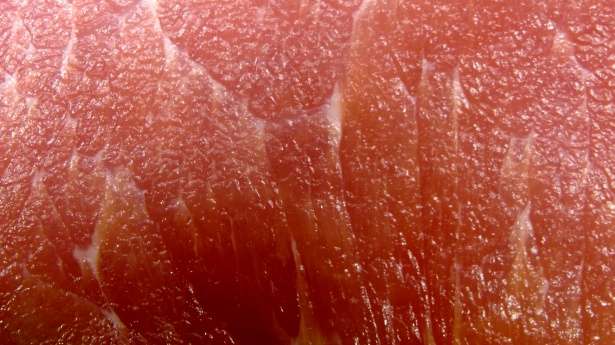March 22, 2016 report
Researchers seek to quantify global benefits of reduced meat diet

(Phys.org)—A small team of researchers at Oxford University has published a paper in Proceedings of the National Academy of Sciences detailing their attempts to merge region-specific health models that are based on diet and weight related risk factors with global emission economic modules, to produce impact estimates on health, economics and climate change, if the consumption of meat were to be drastically reduced in the near future. They claim their findings suggest that the world could save millions of lives and trillions of dollars over the next half century, if a vegetarian or vegan lifestyle were adopted worldwide.
Climate and other scientists have known for quite some time that the business of producing meat and consuming it is a major factor contributing to climate change—not only are trees cut to make way for ranch land, but enormous amounts of food are grown to feed the animals on them. Furthermore, animals produce large quantities of methane. Scientists also know that people do not need to eat meat to stay alive, vegetarians and vegans are proof of that. But, what is still unclear is just how much benefit the world would receive if the people of the world switched over to such a diet. That is what the researchers sought to answer.
To gain a better understanding of what is at stake, the researchers used the models to investigate four scenarios unfolding by 2050: business as usual, a worldwide limited meat diet, a worldwide vegetarian diet and a worldwide vegan diet. Their models show, they report, that the second option, simply reducing meat to global guidelines could prevent 5.1 million deaths by the half century mark—or better yet, 8.1 million fewer people would die if the world converted to a vegan diet. They also found that the limited meat option would lower the amount of food-related greenhouse gas emissions by 29 percent, while the vegetarian option would reduce it by 63 percent and the vegan option would reduce it by 70 percent. The researchers also note that recent estimates suggest that a quarter of all greenhouse gas emissions come from food production.
The team also outlined regional changes, such as suggesting that approximately 75 percent of the benefits of meat reduction would occur in developing parts of the world. They also acknowledge that making such a switch would require serious effort by people across the globe.
More information: Marco Springmann et al. Analysis and valuation of the health and climate change cobenefits of dietary change, Proceedings of the National Academy of Sciences (2016). DOI: 10.1073/pnas.1523119113
Abstract
What we eat greatly influences our personal health and the environment we all share. Recent analyses have highlighted the likely dual health and environmental benefits of reducing the fraction of animal-sourced foods in our diets. Here, we couple for the first time, to our knowledge, a region-specific global health model based on dietary and weight-related risk factors with emissions accounting and economic valuation modules to quantify the linked health and environmental consequences of dietary changes. We find that the impacts of dietary changes toward less meat and more plant-based diets vary greatly among regions. The largest absolute environmental and health benefits result from diet shifts in developing countries whereas Western high-income and middle-income countries gain most in per capita terms. Transitioning toward more plant-based diets that are in line with standard dietary guidelines could reduce global mortality by 6–10% and food-related greenhouse gas emissions by 29–70% compared with a reference scenario in 2050. We find that the monetized value of the improvements in health would be comparable with, or exceed, the value of the environmental benefits although the exact valuation method used considerably affects the estimated amounts. Overall, we estimate the economic benefits of improving diets to be 1–31 trillion US dollars, which is equivalent to 0.4–13% of global gross domestic product (GDP) in 2050. However, significant changes in the global food system would be necessary for regional diets to match the dietary patterns studied here.
Journal information: Proceedings of the National Academy of Sciences
© 2016 Phys.org


















